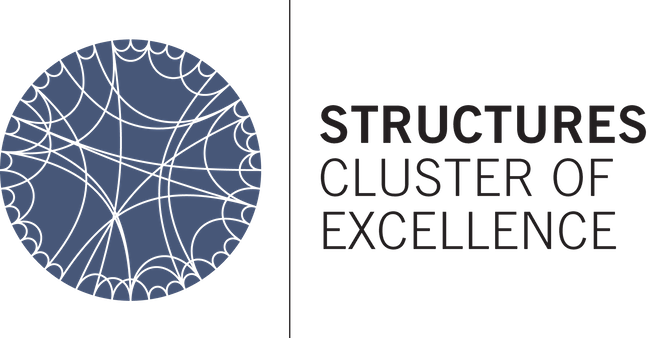Partnerships and Third-party funding
We cooperate together with several partners at Heidelberg and abroad, in particular with:
The Heidelberg Institute for Theoretical Studies (HITS) conducts basic research in the natural sciences, mathematics and computer science with a focus on the processing, structuring, and analyzing of large amounts of complex data and the development of computational methods and software. The research fields range from molecular biology to astrophysics. The research group Groups and Geometry at HITS investigates geometric structures on manifolds, studying in particular moduli spaces and actions of discrete subgroups of Lie groups.
 The cluster of excellence STRUCTURES is an interdiciplary project at Heidelberg University that explores new concepts and methods for understanding how structure, collective phenomena, and complexity emerge from the fundamental laws of physics. These concepts are also central for finding structures in large datasets, and for realizing new forms of analogue computing. STRUCTURES addresses specific, highly topical questions about the formation, role, and detection of structure in a broad range of natural phenomena, from subatomic particles to cosmology, and from fundamental quantum physics to neuroscience.
The cluster of excellence STRUCTURES is an interdiciplary project at Heidelberg University that explores new concepts and methods for understanding how structure, collective phenomena, and complexity emerge from the fundamental laws of physics. These concepts are also central for finding structures in large datasets, and for realizing new forms of analogue computing. STRUCTURES addresses specific, highly topical questions about the formation, role, and detection of structure in a broad range of natural phenomena, from subatomic particles to cosmology, and from fundamental quantum physics to neuroscience.
We take part in several exploratory projects.
![]() The IWR is an interdisciplinary research center for scientific computing which builds bridges across a multitude of disciplines. The center promotes mathematical and computational methods in science, engineering and the humanities. Currently it comprises more than 50 research teams from various faculties.
The IWR is an interdisciplinary research center for scientific computing which builds bridges across a multitude of disciplines. The center promotes mathematical and computational methods in science, engineering and the humanities. Currently it comprises more than 50 research teams from various faculties.
 The GEAR Network brings together researchers from 46 nodes in the U.S., Canada and Europe working in the area of GEometric structures And Representation varieties (GEAR). Its goal is to promote research interactions between network members, to facilitate cross-pollination of ideas between different research communities, and to train students and researchers to cross traditional mathematical boundaries. All graduate students and postdocs of the Research Station are eligible for funding through the GEAR network.
The GEAR Network brings together researchers from 46 nodes in the U.S., Canada and Europe working in the area of GEometric structures And Representation varieties (GEAR). Its goal is to promote research interactions between network members, to facilitate cross-pollination of ideas between different research communities, and to train students and researchers to cross traditional mathematical boundaries. All graduate students and postdocs of the Research Station are eligible for funding through the GEAR network.
The research station is also part of different research grants of the DFG, the German Research Foundation.
The RTG 2229 Asymptotic Invariants and Limits of Groups and Space is a joint research training group of Heidelberg University and the Karlsruhe Institute of Technology. It is part of the HEiKa-Allianz, the Heidelberg Karlsruhe Strategic Partnership launched in 2018.
The DFG (German Research Foundation) has granted the funding of a Collaborative Research Centre / Transregio (CRC/TRR 191) on Symplectic Structures in Geometry, Algebra and Dynamics. This CRC is based at the universities of Bochum and Cologne, and it includes mathematicians from the universities of Heidelberg and Gießen.


